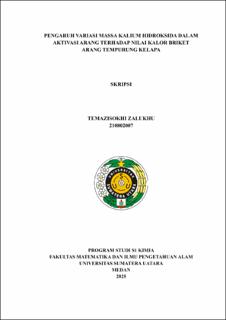Pengaruh Variasi Massa Kalium Hidroksida dalam Aktivasi Arang terhadap Nilai Kalor Briket Arang Tempurung Kelapa
Effect of Mass Variation of Potassium Hydroxide in Charcoal Activation on the Calorific Value of Coconut Shell Charcoal Briquettes

Date
2025Author
Zalukhu, Temazisokhi
Advisor(s)
Simanjuntak, Crystina
Metadata
Show full item recordAbstract
Research has been conducted on the effect of KOH mass variation in charcoal activation on the calorific value of coconut shell charcoal briquettes. KOH was used as an activator of coconut shell charcoal. The coconut shell was pulverized and carbonized at 500°C for 2 hours to produce coconut shell charcoal with a yield of 32%. The coconut shell charcoal was characterized by SEM-EDX. Then the charcoal was chemically activated using KOH with variations in charcoal:KOH mass (1:1; 1:2; and 1:3). The activation process was carried out in 200 mL of distilled water at 85°C for 2 hours. Furthermore, it was physically activated at 800°C for 1 hour. The charcoal was mixed with 10% tapioca adhesive and molded using a hot press. Each briquette was identified for its calorific value with a bomb calorimeter. Briquettes with the highest calorific value were characterized by SEM-EDX and analyzed for quality based on SNI No.01-6235-2000. The calorific value of briquettes without KOH activation was 6608.089 cal/g. The calorific value of KOH-activated briquettes (1:1; 1:2; and 1:3) were 6903.444 cal/g, 7011.1665 cal/g, and 6781.81 cal/g, respectively. The highest heating value of briquettes is found in KOH-activated charcoal briquettes at a mass variation of 1:2. SEM-EDX results showed an increase in porosity and carbon content after activation. KOH-activated charcoal briquettes (1:2) have a moisture content of 6.4875%, ash content of 0.8875%, volatile matter content of 12.1895%, and fixed carbon content of 80.4355%. Charcoal briquettes activated with KOH (1:2) meet the quality of SNI No.01-6235-2000.
Collections
- Undergraduate Theses [1444]
